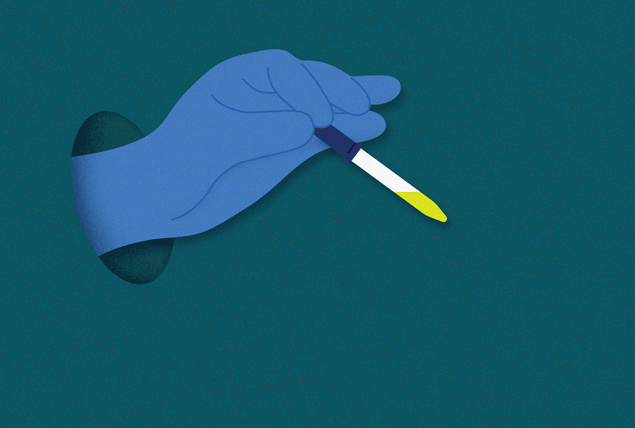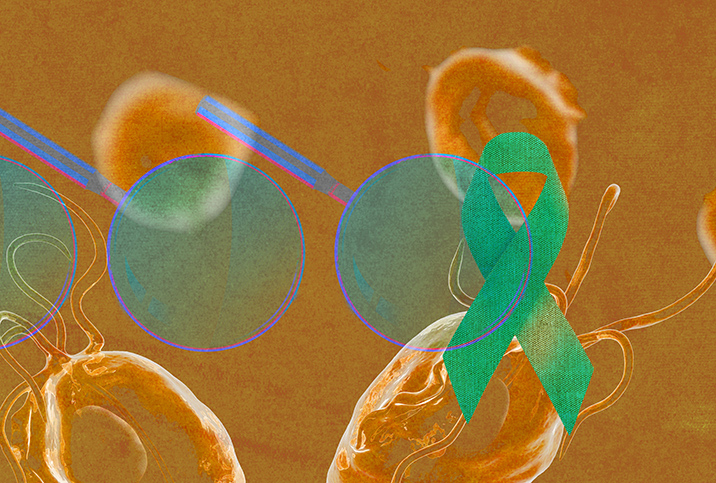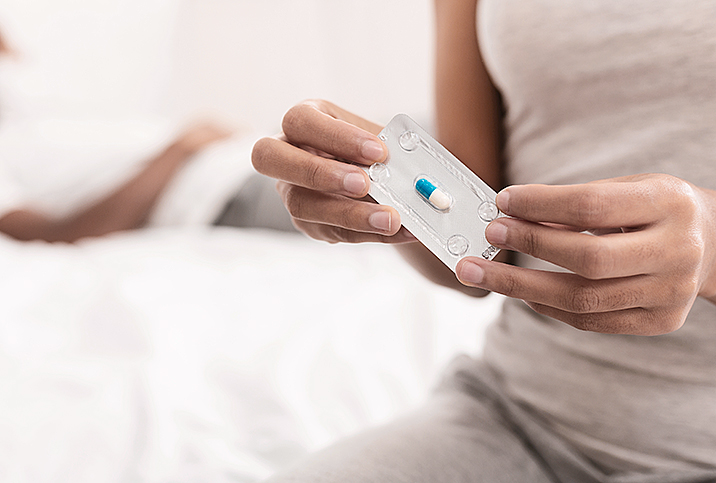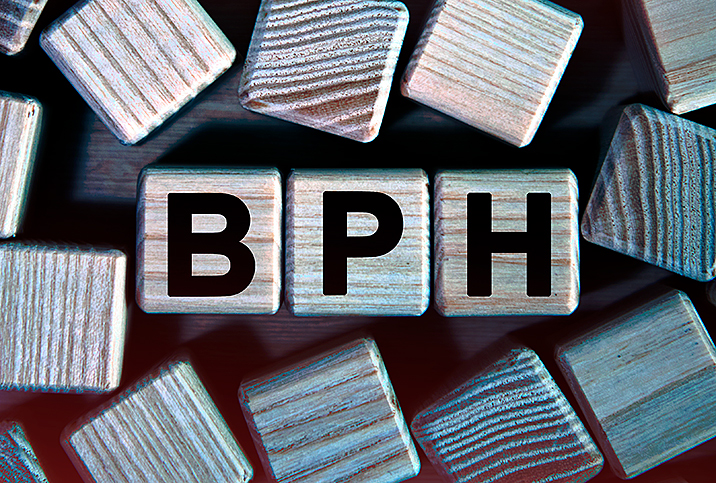How to Date While Living With Benign Prostatic Hyperplasia

Any chronic condition can interfere with romance and relationships, and benign prostatic hyperplasia (BPH) is no exception.
BPH is natural prostate enlargement caused by noncancerous changes in the gland's tissues and smooth muscle cells. It's more common in older guys. By age 50, more than half of men have symptoms, according to Mayo Clinic. But it can occur in younger people, too.
The condition in and of itself isn't a medical concern, said Susie Gronski, D.P.T., a medical advisor and pelvic health therapist in Asheville, North Carolina, who is also a sexual health counselor/educator at Aeroflow Urology.
BPH is unrelated to cancer, and not all men develop symptoms, even if their prostate grows considerably. However, it can be a significant source of frustration and distress for people with severe symptoms, which can include increased urinary frequency and incontinence.
"There are some men with very large prostates who feel like their urinary stream is just fine, and some men with smaller prostates who have extremely bothersome symptoms," said Raevti Bole, M.D., a urologist affiliated with Cleveland Clinic.
What are the mental health side effects of BPH?
These urinary symptoms, and the diagnosis itself, may affect a person's mental health, said Christopher Rodriguez, L.P.C., a licensed professional counselor with Thriveworks Counseling in San Antonio.
"Having a diagnosis such as BPH can cause individuals to experience a number of mental health symptoms, such as anxiety, depression, fear and even anger," Rodriguez explained. "Some can even experience ambivalence and not really know how to feel or what they should feel."
Some people also feel insecure and worry about being judged or ridiculed, he said.
Understandably, the physical and psychological implications can make dating with BPH difficult, but there are ways to manage. Doctors and relationship experts have advice and tips about how BPH might affect date night and how to keep it from killing the mood.
What causes BPH?
Every man's prostate grows naturally with age, generally starting in their 30s, and for many men, this growth will lead to BPH and interference with urine flow.
BPH's exact cause isn't known, but Gronski and Bole explained it's likely due to a combination of age, hormones and genetics. Excessive alcohol consumption and lack of exercise might also contribute, Gronski said.
Research indicates diet may play a role, too, though the specifics aren't quite clear. Some studies have suggested that men who eat more red meat have a higher risk of BPH, according to Mayo Clinic, but others suggest a higher protein intake overall might reduce the risk.
What are the symptoms of BPH?
"You can have many urinary symptoms, such as slow or weak urine stream, pushing or straining to empty your bladder, dribbling urine, having to urinate frequently and getting up at night to urinate," Bole said. "Some people have more serious symptoms, like urinary tract infections, blood in the urine or not being able to empty their bladder."
Men sometimes need a catheter in the bladder if their BPH is severe enough.
BPH itself doesn't directly affect sexual function, but some treatments can affect aspects of sex, including ejaculation.
"While BPH may not directly cause erectile dysfunction [ED], the urinary symptoms might lead to discomfort during sex or affect a man's ability to maintain an erection during sex," said Michael Werner, M.D., the medical director and founder of Maze Men's Sexual & Reproductive Health, based in New York City and Purchase, New York. "Additionally, one medication often prescribed for BPH symptoms—tamsulosin—can have an effect on ejaculation."
One in 10 men who take tamsulosin may experience retrograde ejaculation, Werner added. That means semen enters the bladder instead of exiting through the urethra during orgasm. It isn't harmful, but it can be concerning for patients who are not made aware of this potential effect.
The psychological impact of BPH can affect your sex life and overall health, said Linda Kondilis, Ph.D., a reproductive health psychologist and owner of Orama Wellness in Atlanta.
"Having difficulties with your body and its functioning can lead to emotional challenges such as feelings of failure, low self-esteem, low self-confidence and shame," Kondilis said. "These feelings can extend to fear of social judgment and rejection."
As a result, Kondilis said, some people with BPH might be more prone to issues such as chronic stress, anxiety and depression, all of which can make someone more susceptible to sexual dysfunctions, including low libido and ED.
Tips for dating while living with BPH
Dating while living with BPH might look and feel different than dating without the condition, but it doesn't have to get in the way of your love life.
Seek professional care
If you haven't already done so, schedule an appointment with your urologist, Bole said. BPH isn't curable, but there are several ways to get symptoms under control.
Some treatments for BPH's urinary symptoms contribute to sexual dysfunction, but others improve function, Werner noted. There are also many nonpharmaceutical ways to ensure you're ready to go when the time comes.
"If you are bothered by any of your symptoms or if you have any of the more serious symptoms, such as infections or blood in the urine, see your urologist to discuss options," Bole said. "Sometimes you can make effective lifestyle changes, sometimes you need medication and sometimes a simple procedure is the key to getting a better quality of life. Your urologist will help you decide which path is right for you based on your level of bother."
Working with a pelvic floor physical therapist can be beneficial, too, Gronski said. These providers can help you improve urinary control, reduce pain caused by an enlarged prostate, and boost sexual function through specialized exercises, including Kegels.
Know your triggers
Certain foods and beverages might exacerbate BPH symptoms, so it's important to know your triggers. For example, coffee and alcohol—standard date fare—might irritate the bladder, making you urinate more often. Spicy dishes and chocolate are also common culprits. In order to cut down on bathroom trips during your date, it's best to avoid or limit these items on the day of a date.
Keeping tabs on your blood sugar is a good idea, too, Gronski said. When blood sugar is high, the body produces more urine to eliminate the excess. Generally, sugars and simple carbs—including most fast foods—are most likely to elevate blood sugar levels.
Try to limit these foods and pair them with proteins to avoid a spike. Eating proteins and vegetables before carbs, a technique known as meal sequencing, may also help.
Plan ahead
The physical symptoms of BPH can be inconvenient in romantic situations, but a little advanced planning can go a long way, Bole said. For example:
- Choose activities that won't take you too far from a restroom.
- Pick an aisle seat at the movies.
- Always know where the bathroom is, whether you're at a restaurant or a new acquaintance's place.
"When you're at someone's house, make sure you know where the bathroom is before you get the urge to go, especially if you have bad urgency," Bole said. "Perhaps leave a low light on so you don't stumble in the dark."
Be mindful of when and how much liquid you're drinking throughout the day.
"Resist the urge to avoid drinking any water the day of your date. Not drinking enough water can exacerbate lower urinary tract symptoms. Sip water throughout the day," Gronski said. "If you experience urinary retention, overflow incontinence or incomplete bladder emptying, you may want to consider self-catheterizing right before your date to empty your bladder fully."
Depending on your symptoms, techniques like double voiding—urinating again shortly after the first time—or milking the urethra (for dribbling) can help, Bole said.
Use stress-reduction techniques
You may not be able to avoid first-date jitters, but chronic or excessive stress can harm your health and exacerbate BPH symptoms, including knock-on effects, such as ED. Practicing stress-reduction techniques ahead of time may help. Some examples, according to Kondilis and Mayo Clinic, include the following:
- Meditation
- Yoga
- Maintaining a healthy diet
- Exercising regularly
- Writing in a journal
- Prioritizing sleep
- Connecting with others
- Laughing
- Counseling
There are ways to reduce stress during a date, including breathing exercises, mindfulness tactics and positive self-affirmations.
Working with a counselor or therapist can equip you with the tools needed to manage stress and increase your confidence, experts said. A professional can also support you if you are grappling with more severe mental health issues, such as anxiety or depression.
Communicate with your partner
Even with proper management and careful coordination, BPH symptoms might not disappear entirely. It might seem mortifying, but experts say it's best to communicate with your partner about your condition, provided you feel safe and comfortable doing so.
Urinary symptoms, including frequent urination, are pretty common, Bole said, and most people can relate without judgment. Plus, being open with your partner may help relieve anxiety and improve intimacy.
"It is 100 percent your choice if you want to share. Many people have urinary symptoms even when they don't have BPH or even when they don't have a prostate, for example, overactive bladder. So you don't have to disclose if you don't feel comfortable doing so," Bole said. "If you do share that BPH is causing your symptoms, you may be pleasantly surprised by your partner knowing more about prostate issues than you thought."
Many people know someone—a family member or close friend—who has experienced something similar. It's also an opportunity for education. Tell them about BPH. Everyone's prostate gets larger with age, and many people develop symptoms from the enlargement.
A partner should be relieved to know that BPH is not cancer and there are many treatments available.
Ultimately, these healthcare professionals stressed the importance of remembering that BPH is just one aspect of who you are. Given the prevalence of bladder and bowel issues—especially among people ages 40 and older—it's likely a date will pay more mind to how you treat the waitstaff than how often you use the restroom.
"We are not our diagnosis, and our diagnosis does not define who we are as a whole," Rodriguez said. "It is important to remember your value and the value you bring to someone. There are other more important aspects to you than just a diagnosis."
Be sure to visit a doctor if BPH-like symptoms have you concerned. It's not always easy for men to seek help, especially for something as personal and sensitive as urinary troubles. Plus, a lot of them don't have a physician they see regularly, making that first step difficult.
Video visits have become a viable option for most people, and more physicians and therapists have added them as a service. Giddy Telehealth makes it easy to get connected to a qualified healthcare professional who can help with a variety of conditions, including BPH.


















